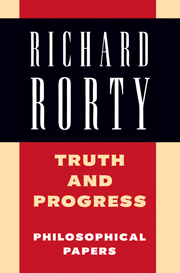Book contents
- Frontmatter
- Contents
- Introduction
- I Truth and Some Philosophers
- II Moral Progress: Toward More Inclusive Communities
- III The Role of Philosophy in Human Progress
- 13 The Historiography of Philosophy: Four Genres
- 14 The Contingency of Philosophical Problems: Michael Ayers on Locke
- 15 Dewey Between Hegel and Darwin
- 16 Habermas, Derrida, and the Functions of Philosophy
- 17 Derrida and the Philosophical Tradition
- Index
15 - Dewey Between Hegel and Darwin
Published online by Cambridge University Press: 06 July 2010
- Frontmatter
- Contents
- Introduction
- I Truth and Some Philosophers
- II Moral Progress: Toward More Inclusive Communities
- III The Role of Philosophy in Human Progress
- 13 The Historiography of Philosophy: Four Genres
- 14 The Contingency of Philosophical Problems: Michael Ayers on Locke
- 15 Dewey Between Hegel and Darwin
- 16 Habermas, Derrida, and the Functions of Philosophy
- 17 Derrida and the Philosophical Tradition
- Index
Summary
James Kloppenberg sees Dewey as one of the philosophers of “the via media,” the via media between idealism and empiricism. The second chapter of his admirable Uncertain Victory is titled “The Radical Theory of Knowledge.” The heart of that theory, as Kloppenberg tells the story, consists in a new, nonatomistic conception of experience – a conception that is the least common denominator of Dilthey's notion of Erlebnisse and James's notion of “a world of pure experience.” On Kloppenberg's account, this new conception of experience has a pragmatist account of truth as a corollary.
Like Kloppenberg's discussion of Dewey, David Hollinger's treatment of James emphasizes the connections between pragmatism and radical empiricism in James's work. Both Kloppenberg and Hollinger see James's and Dilthey's talk about the flux of experience – talk that is continuous with Bergson's and Whitehead's talk of misplaced concreteness – as an important part of what Hollinger calls “a cluster of assertions and hopes about the basis for culture in an age of science.” They both see what Hollinger calls James's “shift toward the panpsychism of the idealists” as an important part of the contribution of German idealism to American pragmatism. Kloppenberg rightly says that Dewey's claim that experience “carries principles of connection and organization within itself is an “echo” of Green and Hegel.
I have no wish to challenge the claim that this sort of panpsychism and this rejection of Humean atomism loomed large in James's and Dewey's minds. A survey of the most interesting and original philosophers of the year 1900 would indeed show, as Kloppenberg suggests, that most of them wanted to close the epistemological gap between subject and object by some form of the panpsychist claim that the two were somehow continuous.
- Type
- Chapter
- Information
- Truth and ProgressPhilosophical Papers, pp. 290 - 306Publisher: Cambridge University PressPrint publication year: 1998
- 41
- Cited by



